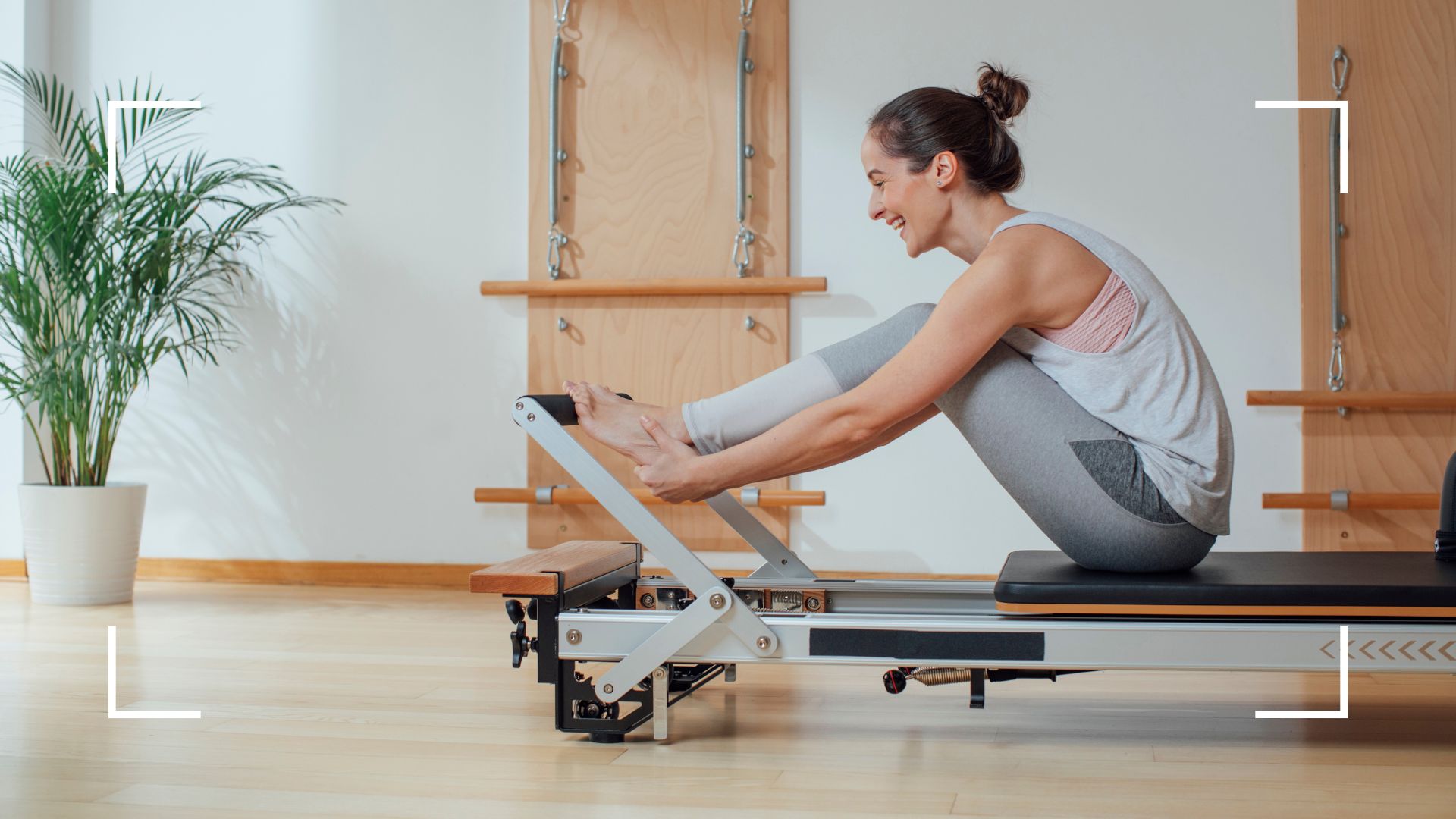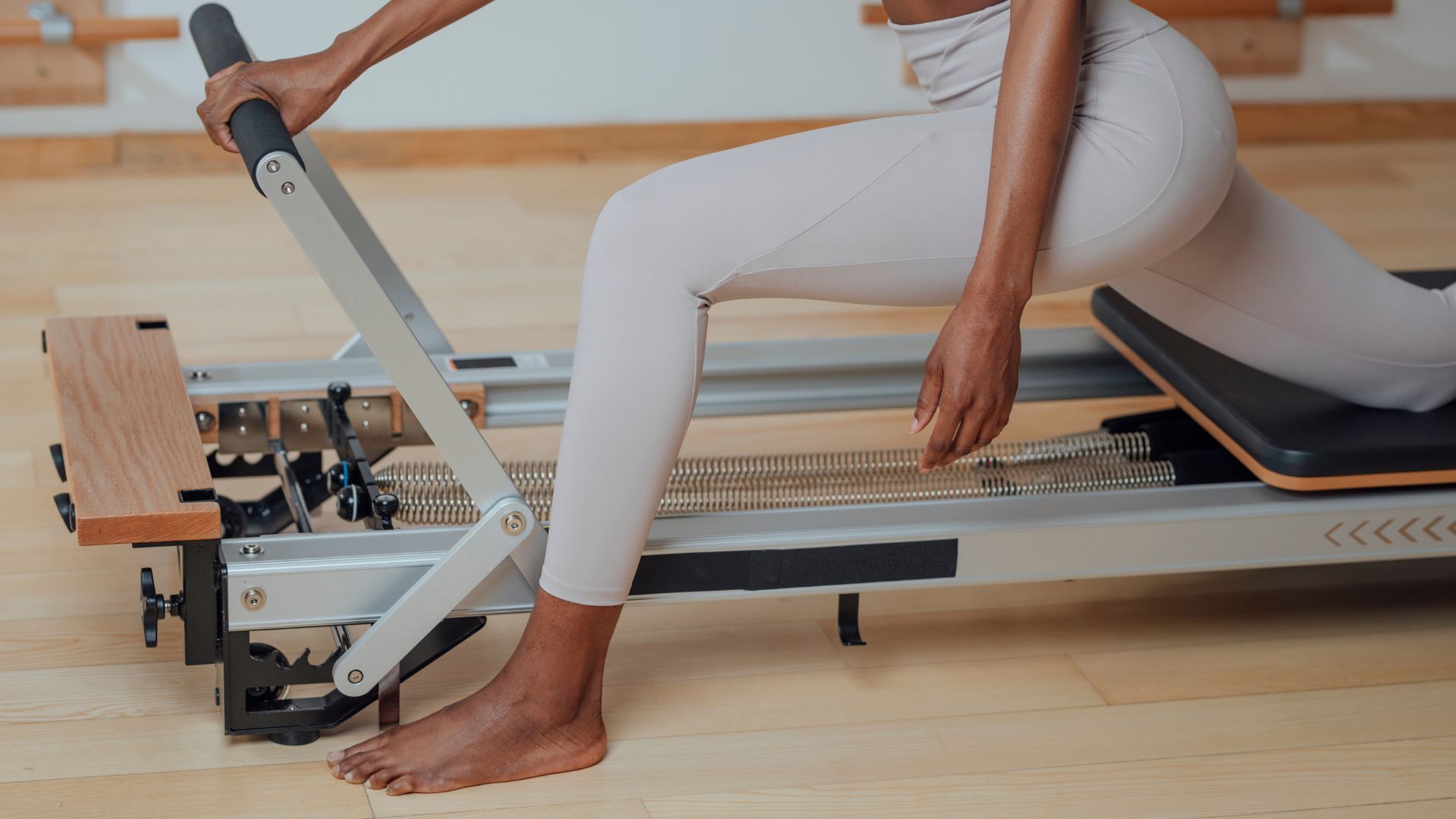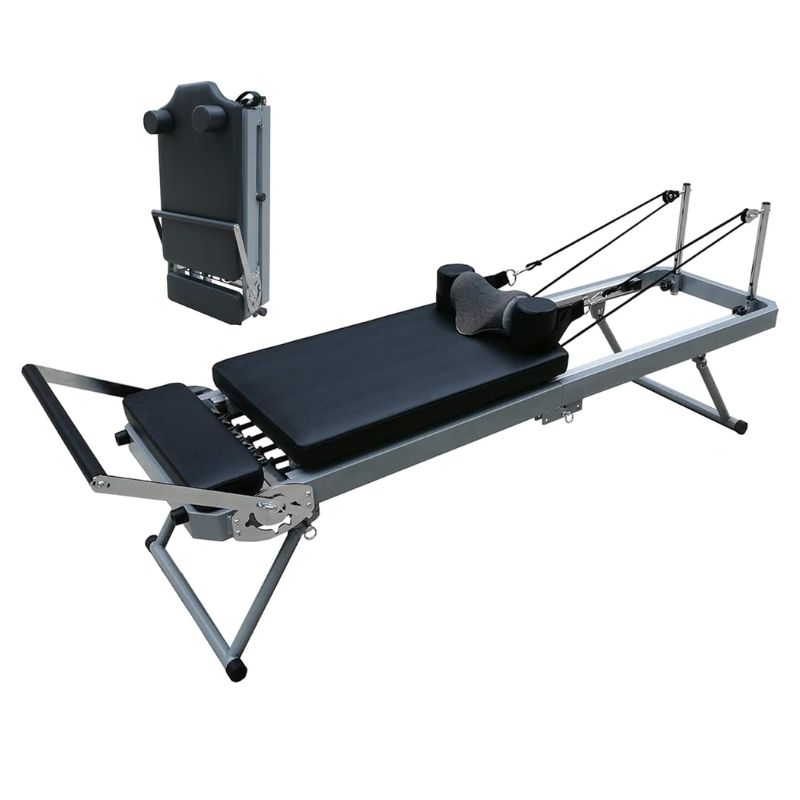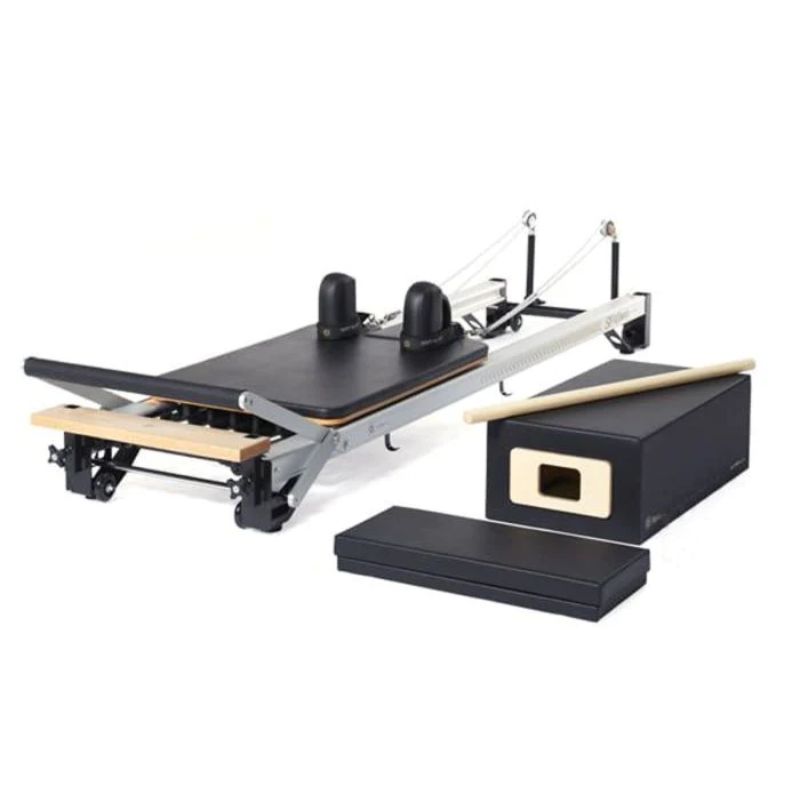
What is reformer Pilates? This type of exercise has been around for more than 100 years but the last few years have seen a surge in new converts - from Jennifer Aniston to Harry Styles - and new studios around the country.
The body-sculpting workout has seen a huge rise in popularity in recent years, and it’s not hard to understand why. It might not be the go-to for Pilates for beginners, but there are so many benefits to be had. "It’s an incredible, low-impact method of boosting musculoskeletal fitness that is kind on the body while giving quick results," says Hollie Grant, a certified reformer Pilates instructor. "Reformer Pilates is intriguing and exciting and looks cool, so people are tempted to give it a go."
Whether you’re a complete novice or an accomplished Pilates performer, adding a reformer to your repertoire could really maximise your results. Here, we reveal all you need to know about what is reformer Pilates and whether you can do this unique type of exercise at home with one of the best yoga mats.
What is reformer Pilates?
Reformer Pilates is a workout done with a specially designed Pilates reformer machine. It tends to be more intense than a traditional full-body Pilates workout done on a mat, thanks to the resistance offered by the springs and straps on the machine.
Although the bed-like rectangular frame may look like a medieval torture device to some, the reformer is a very simple, practical bit of kit. "While regular Pilates is performed on a mat, reformer uses specialised apparatus invented by Joseph Pilates during World War One," explains ex-Strictly star Kristina Rihanoff, now a reformer Pilates teacher. "It’s a sliding carriage with adjustable springs, handles and straps to provide resistance and support for precise movements."
The reformer is designed to facilitate a wide range of Pilates exercises, all of which target core strength, and flexibility and help with overall body conditioning. "The beauty of the reformer machine is that it can help make exercises more challenging, by increasing resistance, easier, by providing support through resistance,’ says Grant. "It offers so many options that mat workouts simply wouldn’t allow."
That's the reason behind reformer Pilates' popularity, she says. However, the mental element of reformer has some people doing Pilates every day. "As you engage in a series of controlled exercises, you must focus not only on the physical execution but also on breathing, alignment and muscle engagement, which cultivates a strong connection between body and mind. This holistic approach nurtures a deeper understanding of your own body," says Rihanoff. If you're weighing up introducing Pilates vs yoga to your routine, this is something to consider.

Benefits of reformer Pilates
- Improve your core strength: As one of the best core exercises at home, reformer targets those deep muscles, helping to build a strong and stable core," says Rihanoff.
- More flexibility: "Pilates encourages a full range of movement at the joint, therefore encouraging better movement," says Grant.
- Better balance: Anyone on a reformer machine knows that they really challenge your balance!’ says Grant. The moving carriage is unstable, making you work harder to improve stability.
- Perfect posture: Regular practice can help to correct posture imbalances and reduce the risk of back pain,’ says Rihanoff.
- Increase muscle tone: It tones and sculpts various muscle groups – just check out the long, lean form of A-list devotees. It's why many people do Pilates for strength training as well.
- Reduce stress: Focused breathing and mindful movements promote relaxation and stress relief. Reformer Pilates has plenty of this, so it's a good option for those looking to learn how to reduce stress and avoid burnout.
Can you do reformer Pilates at home?
Yes, if you’re serious about reformer Pilates - or alternative reformer machine exercises, such as lagree - you may consider investing in your own machine. You can buy some basic models of reformer Pilates machines from Amazon and similar websites for between £400 and £600. Premium options, complete with all the bells and whistles carry a price tag of up to £4,000 and even second-hand models sell for upwards of £1,000, so it isn’t a purchase made lightly.

For under £500, this Pilates reformer machine offers the chance to do reformer Pilates at home - even if you haven't got the space for a bed. It's foldable and has wheels, making it convenient for storage when not in use. Complete with the straps and springs of a regular machine, it's best suited to those between 145cm to 170cm tall. Reviewers say it's easy to put together and available with quick delivery too.

If you're looking to invest in the full package, this reformer bundle - complete with Tall Box and other accessories. The MERRITHEW SPX® MAX Reformer is built to take on continuous, high-intensity exercise in a studio, made with dense EVA foam and durable vinyl upholstery for maximum comfort.
If a full reformer Pilates machine isn't for you right now, Grant says that a band or circle can mimic the effect of the tensioned springs to help increase resistance. This set from Argos is under £25 and comes complete with a resistance band, circle, and ball. All you need is one of the best Pilates apps to find a suitable workout.
Yes, if you’re serious about reformer Pilates - or alternative reformer machine exercises, such as lagree - you may consider investing in your own machine. You can buy some basic models of reformer Pilates machines from Amazon and similar websites for between £400 and £600. Premium options, complete with all the bells and whistles carry a price tag of up to £4,000 and even second-hand models sell for upwards of £1,000, so it isn’t a purchase made lightly.It also requires ample space for the bed, at 2.5m long, plus any add-ons, such as the tower or jumping board, which you may want as you advance.
So, is it possible to get the same benefits at home without the machine? "Mat-based Pilates may not replicate the full range of movements possible on a reformer, but you can still work on your core muscles and flexibility," says Rihanoff, so it is a type of strength training at home. "You can find routines online and invest in affordable props such as resistance bands, exercise balls and foam rollers. However, it’s highly recommended to attend lessons with a certified instructor."
Reformer Pilates classes do tend to be more expensive at around £20 to £40 a go and up to £80 for one-on-one sessions, due to the cost of the machine, smaller class sizes and because instructors need to be certified. However, platforms like ClassPass - one of the best fitness apps - can offer one-off sessions for just a few credits, which may work out cheaper.
Is reformer Pilates suitable for beginners?
While reformer Pilates may look intimidating, Rihanoff says "it’s suitable for most people, including beginners, pregnant and postnatal clients, or rehab after an injury or operation." Most reformer exercises can be appropriately modified to suit those new to this type of workout or new to exercise more generally.
However, going to a reformer Pilates class designed for beginners is important as some will be too fast-paced for a first session.
Some people, including those with chronic conditions such as heart disease, high blood pressure, diabetes, or mobility issues may require more modifications than others when doing reformer Pilates. So, if you're unsure, always talk to your doctor before taking on any new exercise.
Another reason reformer Pilates has become so popular, Grant suggests, is that it breaks the 'go hard or go home' narrative that has led many people to focus solely on cardiovascular fitness. We have started to understand the importance of musculoskeletal strength training exercise, she says. For disciplines like reformer Pilates, you need to dial into your mind-body connection, which means you must concentrate on what you are doing and where your body is in space.







